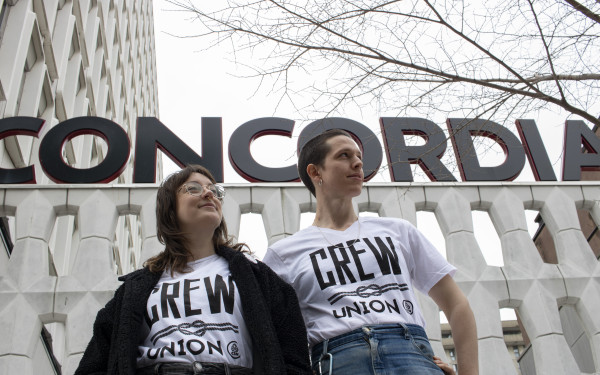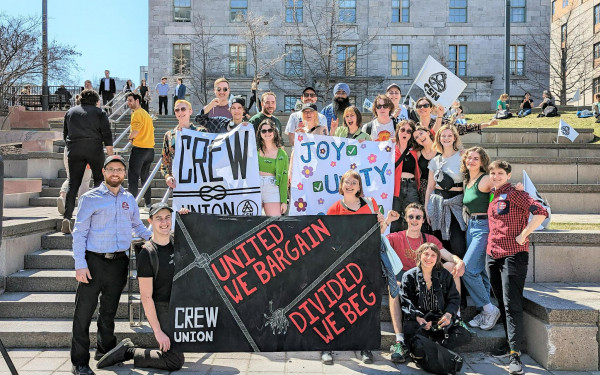Workers denounce ConU administration’s new return to work policies
Seven Concordia unions band together to fight for accessible work
On Sept. 13 and 14, seven of Concordia’s workers’ unions gathered to demand fair pay and the preservation of the university's hybrid work model mandate.
From the seven unions present were the Concordia University Professional Employees Union (CUPEU), the Concordia University Union of Support Staff—Technical Sector (CUUSS-TS), and Concordia Research Education Workers-Confédération des Syndicats Nationaux (CREW-CSN), which represents teaching (TA) and research assistants (RA). While tabling, they informed attendees of their demands and raised awareness regarding their negotiations with the administration.
In 2021, Concordia implemented a hybrid work model, giving university employees a healthier and more productive workspace during the pandemic. However, in late June 2023, Concordia announced the implementation of a four-day-per-week in-person schedule set to begin on Aug. 14. The announcement was made via email.
CUUSS-TS vice-president Philippe Côté said the administration needs to do a better job at accepting workers’ demands. “[The administration needs to] recognize that the university just doesn't work without the 4,500 workers that we represent [...] there's just no Concordia if you remove all support staff, all professionals, all TAs and RAs,” he said.
Charlie Bond, a militant organizer with CREW-CSN, stated that the fight for a more equitable workspace has only just begun. He believes Concordia is trying to isolate unions so that they negotiate on their own. “We believe in solidarity and collective bargaining. That's why we're all here today. To get people's spirits up, to spread the message and express solidarity with one another,” he said.
“[The administration needs to] recognize that the university just doesn’t work without the 4,500 workers that we represent [...] there’s just no Concordia if you remove all support staff, all professionals, all TAs and RAs.” — Philippe Côté
CUUSS-TS union member E, who wished to remain anonymous out of fear of termination of employment, hopes that by making their presence known to students who rely on their services, the administration will feel enough pressure to support the people allowing the institution to function at a very basic level.
“I realized this was something our union would have to do something about,” said Sigmund Lam, vice-president of negotiations for CUPEU. “So I started reaching out to the other unions to see what we could do.”
CUPEU had already planned to mobilize. The Faculty of Arts and Science (FAS) staff did not get a direct notice of the policy change through email, and were instead notified of the change through their managers. On July 17, FAS sent a letter to Pascale Sicotte, the dean of Arts and Science, outlining the various reasons why the longer in-person work week would be a hindrance for both students and staff at the university.
The letter describes at length the benefits of hybrid work to the faculty members, and claims “[Concordia University] is falling behind what other Quebec educational institutions are implementing.” It also calls out the contradictory perspectives of the university, as a month prior—on May 12—the university announced that the hybrid work model was successful and would be maintained. That announcement has been removed from the university's website.
“There is a disconnect between upper administration and what the employees are asking,” said Lam. “Research supports that hybrid work is better for productivity, but if you read what the university is saying, they believe the exact opposite.”
An April 2021 report by Statistics Canada found that a vast majority of Canadian employees consider themselves at least as productive at home as they are in the office.
“When we originally came back, it was two days,” said Lam. “Then it became three. So, if this year it’s four, by next year, it’ll be five.” He adds the unions will put their foot down until the university has no choice but to keep the hybrid work model.
“If Concordia truly believes that they are a next-generation university, they should be at the forefront of the modern work-from-home movement, and not at the end of the pack,” Lam said.
Union members aren’t the only ones participating in the action. Beata Tararuj, the Graduate Program coordinator of Electrical and Computer Engineering created a petition to raise awareness of Concordia's sudden changes to the working model.
“If Concordia truly believes that they are a next-generation university, they should be at the forefront of the modern work-from-home movement, and not at the end of the pack.” — Sigmund Lam

According to Tararuj, the change to the hybrid model was a shock. “For the past two-three years we kept getting emails [from management] on what an amazing job we were doing,” she said. Once she learned that Concordia staff had to return to a four-day-in-person model, she felt “extremely upset” because “when important decisions are made on our behalf, [the university] doesn’t care about listening to what the staff has to say,” she continued.
The change doesn’t only affect Concordia staff, emphasized Tararuj. “My job, it's extremely fast-paced. There's a lot of information going through my office. So when we had two days [at home], I was able to complete all of my tasks,” she said. As a result, she would have an open-door policy at her Concordia office, where students would be able to come and ask questions at any time.
“Now, since we're back to four days, one day to complete all my administrative tasks is not enough,” she said. “So when I come back on Tuesday, Wednesday, Thursday [and] Friday, I have to implement office hours because I need the time to complete the other part of my job. So, are students really benefiting from me being here four days a week? Well, I don't think so.”
Unions are also fighting for an increase in wages.
“So many doctoral students in Concordia, the vast majority of them, earn three times below the average Montreal wage. They earn about $20,000 below the living with dignity wage, which is $32,252 a year,” Bond said. According to the Concordia website, Doctoral students make $29.81 per hour as of 2022.
“When important decisions are made on our behalf, [the university] doesn’t care about listening to what the staff has to say.” — Beata Tararuj
And inflation doesn't make life easier for workers. According to Côté, wages that reflect inflation prices are a must. “I work with 50 different unions and all sorts of fields, and that's the common denominator. Whether you work in an engine factory, the casino, or Concordia. People are facing inflation and so Concordia needs to act accordingly,” he said.
On Sept. 7, President Graham Carr attended the Presidential Welcome Back get-together. The event was held in the EV Building and on the Loyola campus the day before. As students and Concordia staff poured into the room and chatted with each other, union members were busy posting stickers on stairs, boards and mugs, calling for a hybrid work model and gathering supporters.
While Carr was talking to attendees, Tararuj approached him with a letter addressed to him with staff demands. The president didn’t take the physical document. When Tararuj extended her hand out for a handshake, he took a picture with her instead.
When approached by The Link for comment, Carr stated “I don’t want to do that,” and referred reporters to a Concordia spokesperson.
This article originally appeared in Volume 44, Issue 2, published September 19, 2023.

_900_675_90.jpg)



_600_375_90_s_c1.jpg)

